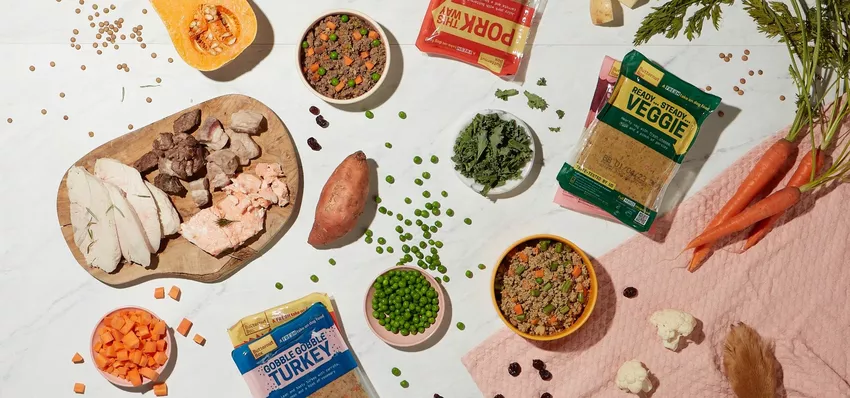What is Complete Dog Food?
- 21 Dec 2019
- 5m read

So, you’ve welcomed a brand new furry friend into the family. But what should you feed them to set tails to wag? Your vet will most likely recommend a ‘complete’ diet, but as a new pet parent, you might be wondering what on earth that means. We’re here to help, with a complete (see what we did there) guide on everything you need to know.
Complete Dog Food: In a Nutshell
For a dog food to be labelled 'complete', it must meet regulations laid down by the European Pet Food Industry (FEDIAF). These regulations define the levels of all the vital nutrients a dog needs, with the word 'complete' indicating that no supplementary foods will be required in your dog's diet. A dog can stay fit and healthy by eating that complete food alone.
What is Complementary Dog Food?
Complementary dog food refers to items which can be fed alongside complete food. They are ‘incomplete’ in that they need to be combined with other foods (usually meat) in order to deliver all of the nutrients your dog needs on a daily basis. Mixer biscuits are an example of a complementary food. These are also subject to FEDIAF rules.
It is important to ensure that you are getting the right balance between complete and complementary food sources for your pooch. Feeding an incomplete diet could lead to deficiencies in nutrients, vitamins and minerals and can cause growth problems, poor skin health and hormone imbalances. All of which get a big paws down from four-legged family members.
What Do Dogs Need in Their Diet?
Now you’re aware of the need for a complete diet for your pooch, it would also be helpful to know what sort of ingredients should be included in dog food to provide these nutrients.
Ingredients to look for in dog food
Unfortunately, there isn’t a one size fits all answer for this one. The truth is that all pooches are unique in their daily nutritional requirements. Various things factor into this, including life-stage, activity level, health conditions etc.
Protein should make up the majority of their diet, followed by fat, both of which will likely come from meat and fish sources. It is essential for growth and repair, as well as providing energy. Look for foods with as high a meat content as possible.
Next up is fibre, which will be supplied through consumption of vegetables and complex carbohydrates. This will keep your pooches poops (that’s quite hard to say?!) up to scratch as it aids digestion, aka the slop stopper.
Last, but certainly not least, we have vitamins and minerals. The list of benefits is endless, some of the most important ones being their contribution to building strong bones and supporting immune responses.
What are the Signs of a Poor, Unbalanced Diet in Dogs?
If you’re worried that your pooch isn’t getting all of the nutrients that they require, there are some signs to look out for which might confirm your suspicions. We recommend consulting with your vet before you take any actions to change their diet as they can help to identify where the key problems are.
Weight
Your vet can help out with this one by giving your dog a BCS (Body Condition Score) at their next appointment. We also have a handy video which can help you identify if your dog is overweight and what an ideal weight should feel like.
Dull coat
Has your pup’s coat lost its sparkle? The kind of shine that used to blind other pet parents in the park? In addition to a dull coat, other hair conditions such as dandruff, may be a key indicator that something crucial is missing from their diet. Diets rich in essential fatty acids, such as omega-3, helps to promote healthy coat growth. Shine pooch, shine.
Skin irritation
Red, itchy and flaky skin? Skin issues are a common symptom of an incorrect diet. Certain foods can irritate your dog and cause their body to release histamine, which is the thing which causes the itching. If your dog’s diet doesn’t include all of the essential nutrients to promote cell turnover then your pooch’s skin will struggle to heal. Time to ditch the itch.
Digestive issues
As a pup parent, we’ve all experienced the feeling of pure devastation when our pooches produce a poo that resembles a muddy puddle. Sigh. But it’s not them we should be pointing the finger at. What goes in must come out after all. If the in-part of the process isn’t perfected, then the final product will leave something to be desired. The proof is in the poop.
Lethargy
The average adult dog will sleep between 8 and 12 hours a day. Puppies and senior dogs are at the higher end of the snoozer scale at around 18-20 hours a day. Nice for some. So, before you brand your pooch a sofa loafer, be mindful of their sleep requirements. However, if your dog is showing consistent signs of fatigue outside of sleeping hours or has little enthusiasm towards walks something else could be at play.
Is Butternut Box Nutritionally Complete?
Yes, Butternut Box is nutritionally complete.
In order to make sure we meet (and beat) FEDIAF obligations, we’ve gathered together a brainy vet and nutritionist team to do all of the required analysis and measurements. We also have FEDIAF consultants on board to make sure we’re out-performing the legal bar in every pouch. As we only use top-quality ingredients (the human-quality kind you could pick up at your supermarket) we're happy to do the taste-testing, too. That means we know for a fact that our meals are scientifically complete and we're confident that they're delicious. The pawfect choice, we reckon.
Feeding your pooch Butternut Box's complete, fresh dog food means you can be assured they're properly nourished and are avoiding nasty ingredients.

.webp)


